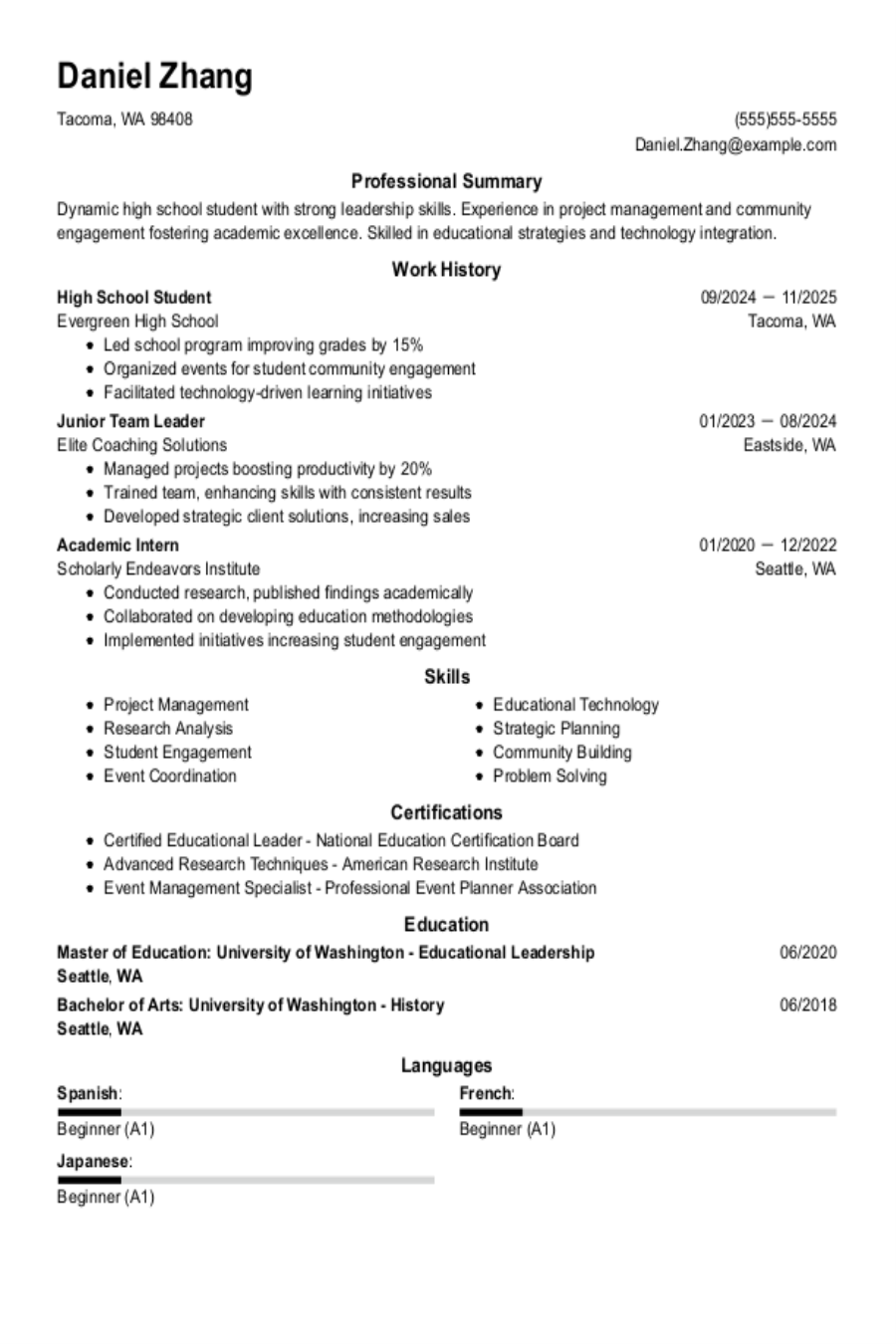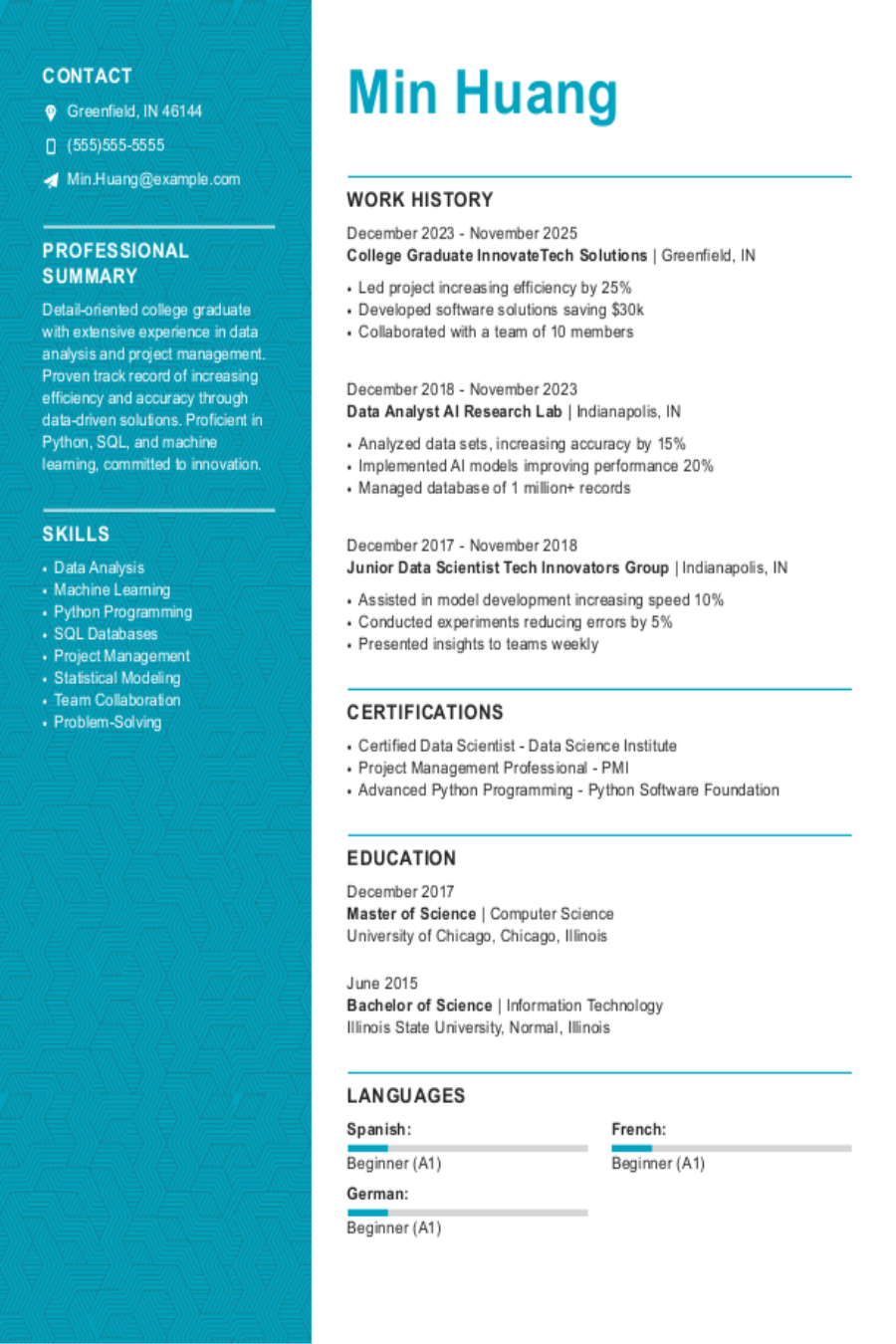Popular Federal Resume Examples
Experienced federal resume
An experienced federal resume should highlight specific expertise and indicate past roles using the federal application format that indicates the role series and grade.
Uses the federal grading system: In the federal government, every job has a series and a grade. The series is a number that identifies the type of work, like 0343 for program analysts or 2210 for IT specialists, and the grade shows the level of responsibility and pay, like GS-5 for entry-level or GS-11 for mid-level positions. This candidate uses this systems to describe their past experience.
Uses active language: This applicant uses strong action verbs like "conducted" and "drafted" to give their resume a sense of motivation and impact.
No experience federal resume
A candidate with no experience applying for a federal role should highlight extracurricular activities and transferable skills.
Begins with a resume objective: Opening with a goals-oriented resume objective is ideal for a candidate in the beginning stages of their career.
Includes academic accomplishments: As an entry-level candidate, this applicant uses academic accomplishments and volunteer work to bolster their resume despite limited experience.
More resume examples
Additional Guides
- Amazon
- Analyst
- Architecture
- Art
- Artist
- Arts
- Aviation
- Banking
- Billing
- Biology
- Biotech
- Budtender
- Business
- Business Operations
- Cashier
- Chef
- Chemical Engineering
- Chemistry
- Child Care
- Civil Engineering
- College
- College Graduate
- Communications
- Compliance
- Computer
- Computer Hardware
- Computer Science
- Computer Software
- Construction
- Consultant
- Cook
- Copywriting
- Cosmetology
- Culinary
- Customer Service
- Customer Success Manager
- Cyber Security
- Data Systems Administration
- Dentistry
- Driving
- ECommerce
- Education
- Electrical
- Electrical Engineering
- Engineering
- Entertainment
- Entry Level
- Environmental
- Esthetician
- Event Planning
- Executive
- Fashion
- Film
- Finance
- Firefighter
- Fitness & Nutrition
- Food Service
- Government
- Graphic Designer
- Handyman
- Healthcare Support
- High School Student
- Hospitality
- Human Resources
- Industrial Engineering
- Insurance
- Interior Design
- Internship
- Inventory Management
- IT
- Janitorial
- Law
- Law Enforcement
- Legal
- Library Museum
- Logistics
- Maintenance
- Manager
- Marketing
- Mechanical Engineering
- Medical
- Mental Health
- Metal Work
- Military
- Music
- Nursing
- Performing Arts
- Pest Control
- Pharmacy Technician
- Photographer
- Physical Therapy
- Pilot
- Plumbing
- Product Manager
- Product Owner
- Production
- Production Assistant
- Program Manager
- Project Manager
- Psychology
- Purchasing
- Quality Control
- Radiologic Technologist
- Real Estate
- Restaurant Manager
- Retail
- Safety Security
- Sales
- Sales Associate
- Scholarship
- Sciences
- Server
- Shipping
- Skilled Trades
- Social Services
- Software Engineer
- Special Education
- Sports
- Statistics
- Stay At Home Mom
- Student
- Supervisor
- Teacher
- Teen
- Training Development
- Transportation
- Travel
- Ux Designer
- Veterinary
- Virtual Assistant
- Waitress
- Web Development
Federal Resume Template
Looking for a guide? Try this federal job template as your base—personalize it with your details to fit the role perfectly.
Lois Murray
Tacoma, WA 98401
(555) 555-5555 | lois.murray@example.com
Objective
Experienced federal program analyst seeking to apply policy analysis, project management, and interdepartmental coordination skills to support evidence-based decision-making in federal programs.
Work Experience
Program Analyst (GS-0343-11)
Department of Health and Human Services
Tacoma, WA | 09/2023-05/2024
- Conducted comprehensive program evaluations and policy analyses for multiple health initiatives, leading to a 20% improvement in program efficiency
- Developed and presented detailed reports and briefings for senior leadership, supporting data-driven decision-making across three divisions
- Coordinated interdepartmental projects, ensuring compliance with federal regulations and timely delivery of objectives
- Implemented process improvements that reduced reporting errors by 15% and enhanced workflow efficiency
- Mentored junior analysts on data collection, reporting standards, and analytical methodologies
- Designed and maintained dashboards tracking key program metrics, enabling leadership to monitor progress and resource allocation
- Participated in cross-functional task forces to standardize evaluation methods and reporting procedures
Program Analyst (GS-0343-9)
Department of Health and Human Services
Tacoma, WA | 09/2022-06/2023
- Assisted in evaluating grant programs and service delivery, supporting senior analysts in preparing official reports
- Collected, cleaned, and analyzed large datasets to track program outcomes and compliance metrics
- Drafted executive summaries and presentations for congressional briefings and interagency meetings
- Supported process improvement initiatives that decreased data entry errors by 10%
Education
Master of Public Administration, George Washington University – Washington, DC, 2018
Bachelor of Arts, Political Science, University of Maryland – College Park, MD, 2015
Certifications & Training
- Project Management Professional (PMP) – PMI, 2020
- Data Analysis for Policy Professionals – Federal Training Institute, 2019
Skills
- Policy Analysis & Evaluation
- Program & Project Management
- Data Analysis & Reporting
- Stakeholder Engagement & Communication
- Leadership & Mentorship
Writing Your Federal Resume
With a solid understanding of effective resume examples, you're now prepared to build your own. We'll walk you through how to write a resume step by step, ensuring every section is covered thoroughly.
List your most relevant skills
An effective skills section for your federal resume should focus on highlighting both technical and interpersonal skills relevant to the job. By using keywords from the job listing, you not only appeal to human recruiters but also improve your chances with applicant tracking systems (ATS). This strategic alignment demonstrates how well you meet the specific needs of the role.
Take time to analyze the job description and identify key phrases that resonate with your experience. Incorporating these keywords into your skills section can significantly improve visibility in both manual reviews and automated screenings.
Example of skills on a federal resume
- Proficient in analyzing federal regulations and policies to ensure compliance
- Adept at preparing comprehensive reports and presentations for stakeholders
- Strong communicator with the ability to convey complex information clearly
- Collaborative team player committed to achieving organizational goals
Highlight your soft skills on your resume. Employers value interpersonal abilities as they're challenging to teach and can greatly improve team dynamics.
Highlight your work history
When crafting your work experience section, focus on showcasing your achievements. This part of your resume should highlight not just what you've done, but how well you did it. Use specific examples that demonstrate your skills in action and include relevant keywords to catch the eye of hiring managers.
Each job entry should contain essential details like your title, the employer's name, and the dates you were employed. This information is important for establishing your credibility and showing employers a clear timeline of your professional journey.
Remember to list federal roles by including their series and grade. If you’re applying for a federal job for the first time and haven’t held a federal position, you can also list the series and grade of the position you’re targeting to show HR the level you’re aiming for.
Example of a federal work experience entry
- Environmental Protection Specialist (GS-0028-9)
U.S. Environmental Protection Agency – Denver, CO
06/2022 – 08/2025 - Conducted environmental assessments for industrial sites, ensuring compliance with federal regulations and reporting requirements
- Developed and maintained databases tracking pollution metrics, improving data accuracy by 20%
- Coordinated field inspections with regional teams, ensuring timely completion of compliance reviews
- Prepared technical reports and presentations for agency leadership and community stakeholders
- Assisted in training junior staff and interns on environmental monitoring procedures
Quantifying achievements is essential in federal roles as it provides clear evidence of your impact. For example, stating that you facilitated a 40% reduction in processing times for grant applications not only highlights your efficiency but also demonstrates your contribution to improving governmental operations.
Include your education
The education section of your federal resume should be structured in reverse-chronological order, starting with your most recent degree. Include relevant degrees, diplomas, and certifications while omitting your high school diploma if you hold a higher qualification. This approach helps highlight your most advanced education.
If you are currently enrolled in an educational program or have incomplete coursework, list the highest level of education achieved and provide an expected graduation date. Including bullet points that detail relevant coursework or academic honors can strengthen this section for students or recent graduates who may lack extensive work experience.
Common certifications for a federal resume
- Certified Government Financial Manager (CGFM) – Association of Government Accountants (AGA)
- Project Management Professional (PMP) – Project Management Institute (PMI)
- Certified Federal Contract Manager (CFCM) – National Contract Management Association (NCMA)
- Certified Information Systems Security Professional (CISSP) – International Information System Security Certification Consortium (ISC)²
Sum up your resume with an introduction
Creating a strong profile section in your resume is important for making a powerful first impression on potential employers. This section serves as an introduction to your qualifications, summarizing what you bring to the table.
If you're an experienced applicant, using a professional summary can be particularly beneficial. It allows you to showcase your most significant achievements and relevant skills right at the top of your resume, helping recruiters quickly understand how well you fit the role based on your proven success.
Early-career candidates should write a goals-oriented resume objective that highlights your career development.
Professional summary example
Results-driven federal compliance manager with over 10 years of experience in regulatory compliance and policy development. Demonstrated success in navigating complex legislative frameworks, improving program effectiveness, and fostering collaborative relationships across agencies. Expert in data analysis, strategic planning, and stakeholder engagement, ensuring alignment with federal mandates.
Resume objective example
Enthusiastic federal job seeker eager to use strong analytical and communication skills to support a dedicated team in navigating complex regulations. Committed to fostering efficiency and compliance while contributing positively to organizational goals through diligent research and collaboration.
When crafting your resume profile, always start with your job title. Starting this way conveys your professional identity right away and helps employers quickly understand who you are and what you bring to the table.
Add unique sections to set you apart
Improve your resume with optional sections that highlight your unique qualifications for federal positions. These sections allow you to present a fuller picture of yourself as a job seeker.
By including relevant hobbies and volunteer experiences, you can demonstrate personal values and skills that align with the federal sector's mission. Sharing your commitment to community service or showcasing how you develop key competencies in your free time offers potential federal hiring managers insight into your character and work ethic.
Three sections perfect for a federal resume
- Languages: In a federal job, effective communication is important. Highlighting your language skills on your resume showcases your ability to connect with diverse communities, which helps improve collaboration and service delivery.
- Volunteer Work: Including volunteer work on a resume improves your professional skills and highlights your dedication to community service. It demonstrates to employers that you are proactive and committed to making a difference while gaining valuable experience.
- Quantifiable Metrics: In the federal sector, quantifiable accomplishments are important to illustrate your impact on policy and efficiency. Highlight these achievements by incorporating them into your work history or featuring them in a separate accomplishments section.
5 Resume Formatting Tips
- Choose a format that matches your career stage.
Selecting the right resume format depends on your career level and experience. If you have a solid work history, consider a chronological format to showcase your growth. For those just starting out or changing careers, a functional resume can effectively highlight your skills. A combination resume offers flexibility for both experienced and novice job seekers.
- Pick a smart resume template.
Using a professional resume template improves readability and formatting. This approach allows your information to stand out clearly, making it easier for hiring managers to scan your credentials. When choosing a custom format, ensure it’s straightforward and compatible with applicant tracking systems by selecting clear, professional fonts.
- Use an appropriate font.
Select a clean, professional font to improve resume readability. Opt for widely accepted fonts such as Helvetica, Georgia, or Verdana to ensure clarity for both ATS and hiring managers.
- Use consistent formatting.
Align your resume text to the left and maintain uniform margins to create a polished and professional look that captures attention.
- Keep your resume to one or two pages.
When outlining your resume, it's essential to remember that resumes should be one page long unless you have extensive experience. Focus on keeping your content concise to highlight the most relevant information effectively.
Tools for Your Job Search
Are you preparing to apply for a federal position that aligns with your career goals? Before sending in your application, take advantage of our ATS Resume Checker. This essential tool provides insights into how well your resume performs with the automated systems used by many federal agencies during their initial screening process.
Need help crafting an impressive resume? Our AI Resume Builder is here to assist you with tailored recommendations specific to governmental roles, complete with professional templates designed to showcase your qualifications and experiences effectively.
Frequently Asked Questions
Last Updated: January 8, 2026
Absolutely. A cover letter is important because it improves your resume by providing context and creating opportunities for you to engage with employers. This is your moment to express why the federal role excites you and how your unique experiences make you a great fit. Don’t overlook this chance—write a cover letter that truly reflects your qualifications.
For a quick and effective solution, try our AI Cover Letter Generator. It allows you to craft tailored cover letters in just minutes, complete with various cover letter template options that match your resume perfectly, ensuring a polished and cohesive application package.
Resumes are concise, typically one to two pages, focusing on your work experience and skills relevant to the job you're applying for. In contrast, CVs can extend over several pages and include comprehensive details about your academic achievements, research contributions, and professional experiences.
Use a CV when applying for roles in academia or specialized fields like law or medicine. For these scenarios, our online CV Maker service can assist you in crafting a tailored document quickly and efficiently. Choose from various CV templates designed for different industries and career levels to ensure your CV stands out.
A federal resume should generally be one to two pages long, with one page being sufficient for most applicants. However, applicants with extensive experience or specialized qualifications may opt for a two-page resume format to effectively showcase their background and accomplishments.
To improve your federal resume, focus on the essential skills that match the job description. Examine the listing closely to pinpoint specific keywords that demonstrate your fit for the position. Incorporating these terms into your resume will strengthen your application and showcase your qualifications effectively.
To improve your networking skills as a federal employee, regularly reach out to former colleagues and maintain those connections. Joining relevant professional organizations can provide valuable opportunities for engagement. Additionally, keep your LinkedIn profile current to stay informed about industry trends and networking events.
To thrive in the federal sector, focus on continuous improvement. Explore training programs that improve your skills and consider earning relevant certifications. Engage with professional organizations, keep abreast of federal policies through reputable sources, and participate in workshops to deepen your expertise.
Was this information helpful? Let us know!
Keith is a Certified Professional Resume Writer (CPRW) and trusted media source in the career industry with over a decade of experience helping job seekers stand out.
More resources

How to Write a Resume for an Internal Position (Guide + Examples)
Ready for a new role within the same company? We ll help you...

The Great Workplace Reckoning: How 2025 Burned Out Workers & What’s Next for 2026
The workforce spent much of 2025 in survival mode navigating ...

What Is a CV? Curriculum Vitae Definition & Who Should Have One
Do you need to know what a CV stands for? We share the definit...

Military Resume: Examples & Templates
As a military professional you need a resume that highlights ...

High School Student Resume: Examples & Templates
As a high school student your resume needs to highlight abili...

College Graduate Resume: Examples & Templates
As a college graduate crafting a resume that captures the att...

